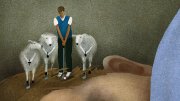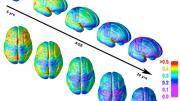How does a pianist master a new composition, or a teenager memorize his locker combination at the start of the semester? A good night’s sleep may play a role. New research shows—for the first time in humans—that during sleep the motor cortex, the part of the brain that controls movements, replays skills that it learned during the day.
Previous experiments with rodents, conducted in the 1990s, found that as rats slept, their neurons fired in the same order that they had while awake as they ran through a new maze. “There are circuits in the brain that appear to reiterate or replay certain patterns of activity after learning a new task,” explains instructor in neurology Daniel Rubin, of the Center for Neurotechnology and Neurorecovery (CNTR) at Massachusetts General Hospital (MGH). Until recently, scientists were unable to confirm the existence of replay in the human motor cortex because they could not record information from this part of the brain during sleep. That recently changed with the help of a man with a spinal cord injury enrolled in the BrainGate clinical trial. Founded and headquartered at MGH, the BrainGate consortium includes researchers at Brown, Stanford, Emory, the University of California, Davis, and the U.S. Department of Veterans Affairs. People enrolled in the trial all have some form of paralysis. They undergo a surgery in which an electrode is inserted on the brain, explains associate professor of neurology Sydney Cash, co-director of the CNTR. The electrode is one end of a small device that functions as a brain-computer interface; the other end pokes out from the scalp about a centimeter and during research activities is attached to a wireless transmitter. The man being studied in this case cannot move his arms and legs, but the device allows him to control a computer cursor just by thinking about moving his hand. Researchers asked him to play a video game modeled on the electronic memory game “Simon,” popular in the 1980s. The man watched a sequence of flashing lights, and then thought about moving his hand to click lights in the same pattern. The game was designed so that he would master one particular sequence, or “target test.” Sensors in his motor cortex recorded the firing of his neurons as he played the game. That night, while he slept, the sensors continued to record his motor cortical activity. “We found, as he was sleeping, the motor cortex continued to play back that activity in the same sequence found in the target sequence,” Rubin explains. “The same neurons were firing in the same order. This was, as far as we can tell, the most direct evidence that this same replay effect that’s been seen in other systems was at work in humans in a part of the brain that hadn’t previously been explored.”
The pattern of firing neurons sped up during sleep, echoing findings from previous animal studies.
The researchers could see that the pattern of firing neurons sped up during sleep, echoing findings from previous animal studies. “When you remove the physical constraints of actually doing the task, your brain seems to be able to rehearse it much faster,” Rubin says. The scientists were also interested to note that replay took place not during REM sleep, which is tied to dreaming, but during deep, slow-wave sleep, which occurs in the first three or four hours of the night. They theorize that replay during this period helps the brain consolidate new information, moving it from short-term to longterm memory. Questions remain. “There are many different kinds of learning that happen in the brain for different circumstances,” Cash acknowledges. Does the replay that occurs with spatial learning tasks “underlie other types of learning in other areas of the brain as well?”
Rubin says future studies could explore replay in more detail. Might varying the difficulty, complexity, or importance of a task affect the process? For example, he wonders if offering study participants a reward for successfully completing tasks might increase the amount of replay and increase their rate of learning. Other factors could be relevant too, he adds. “Things like, how much sleep did he get the night before? When did he last have a cup of coffee?”
Such details could benefit people with neurological diseases or injuries. By sharpening scientists’ understanding of how the brain learns, the researchers hope to help people more efficiently regain function after an injury. The BrainGate team is refining the device used in this study so that it’s wireless and fully implanted in the skull. Ultimately, Rubin says, the team is working to build technologies that could help people with paralysis move and even speak. In the meantime, this study offers an additional warning for night owls. “There’s already so much data out there saying that sleep is really important,” says Rubin, “but here’s another piece [of evidence] for that too.”









